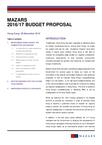
Mazars submits its proposals for the 2016/2017 Hong Kong budget
INTRODUCTION
Traditionally, Hong Kong has been regarded an attractive place for foreign investments due to, among other things, its simple tax system and low tax rate. Questions however have been raised in recent years whether Hong Kong is still able to maintain its competitive edge amidst our neighbor jurisdictions’ continuous improvement of their business environment, including favorable tax policies and measures, to compete with foreign investments.
Mazars Hong Kong has been submitting budget proposals to the Government for several years to share our views on the formulation of tax policies and budget measures, with particular emphasis on how to maintain Hong Kong’s competitiveness edge in our tax system. In our last year’s budget proposal, one of the recommendations was to provide tax incentive for setting up regional headquarters in Hong Kong. This aims to preserve Hong Kong’s competitiveness in attracting MNC to set up headquarters for the Asia Pacific region.
While we welcome Mr. John Tsang’s proposal in his Budget 2015/16 to provide tax incentives in order to promote Hong Kong to become a preferred choice of location for regional treasury centres, we consider the promotion of Hong Kong as regional headquarters is important and should be carried out in tandem with that for treasury centres.
In addition, in the last year’s policy address, Mr. CY Leung indicated that the Government is studying the development of Hong Kong’s aerospace financing business so as to strengthen Hong Kong’s status as an international aviation and financial centre.In the subsequent Budget released, Mr. Tsang supplemented that the Government shall ride on the experience of other jurisdictions and explore possible measures that can promote aerospace financing business in Hong Kong.
Despite the Government’s ambition to compete with our neighboring countries in the aerospace financing business, under our existing tax legislation, a Hong Kong lessor is not entitled to any depreciation allowance on the costs of an aircraft if it is leased to a non-Hong Kong person who will not use the aircraft in Hong Kong even though his rental income is fully chargeable to Hong Kong profits tax. The denial of depreciation allowance is due to the operation of Section 39E of the Inland Revenue Ordinance (“IRO”) which was legislated as an anti-tax avoidance provision. Many tax practitioners, including Mazars Hong Kong, consider the scope of Section 39E is too broad bringing unintentional impact on those genuine aircraft leasing businesses in Hong Kong. In order to rectify this anomaly, we strongly recommend the Government to revise Section 39E of the IRO and propose amendment bill to address the issue sooner rather later.
Worse still, the impact of Section 39E is far reaching. Section 39E also denies depreciation allowance on the cost of moulds and machineries to those Hong Kong businesses which provide these moulds and machineries to their suppliers for manufacturing outside Hong Kong. Whilst the profits of these taxpayers are fully chargeable to Hong Kong profits tax, they are not entitled to any depreciation allowance on the costs of the moulds and machineries despite that such assets used for the production of their chargeable profits.
Over the past years, we have repeatedly urged the Government to review the anomaly created by the operation of Section 39E and address the unfairness in our tax system. We however truly regret that this has never been on the Government’s agenda. One of the reasons for the Government’s refusal to amend Section 39E is that it would be difficult for the Inland Revenue Department (“IRD”) to verify (i) whether the moulds and machineries are used for the manufacturing of goods sold solely to the Hong Kong taxpayer; (ii) whether the assets have been sold; (iii) whether depreciation allowances of the same moulds and machineries have been claimed by other enterprises, etc. given that the relevant assets are located outside Hong Kong. We however consider that such practical difficulties in verifying taxpayers’ deduction claim are not unique for moulds and machineries but exist for all business transactions involving non-Hong Kong companies. With the rapid development of our treaty network, the IRD can always obtain the necessary information through the exchange of information article in its Comprehensive Double Taxation Agreements with treaty partners.
We believe that while it is important for the Government to improve its tax regime to promote the development of new industry, e.g. aircraft leasing business, it is equally or even more important to address the problem facing by our existing businesses and fix the tax unfairness created by the operation of Section 39E. As such, we would still include this recommendation item in our proposal this year.
The global economic environment is complex. While the US has recently raised its interest rate for the first time in nearly a decade, a number of other countries are still implementing quantitative easing measures to spur their economies. As the Hong Kong dollar is pegged to the US dollar, the borrowing costs in Hong Kong are set to rise. Coupled with the weakest economic growth in the mainland China in almost two decades, we believe 2016 will be a challenging and uncertain year for Hong Kong people. According to a survey by CPA Australia released on 19 October 2015, 53% of the Hong Kong’s professionals felt pessimistic about Hong Kong economy in 2016. In addition to maintaining Hong Kong’s tax competitive advantage, we would also propose measures to relieve people’s hardship and cost of living pressures.
Our budget proposal this year would cover the following three broad areas:-
- Maintain Hong Kong’s tax competitive advantage;
- Better prepare for the future challenges; and
- Improve people’s livelihood.
Please feel free to download the full report for detailed information


